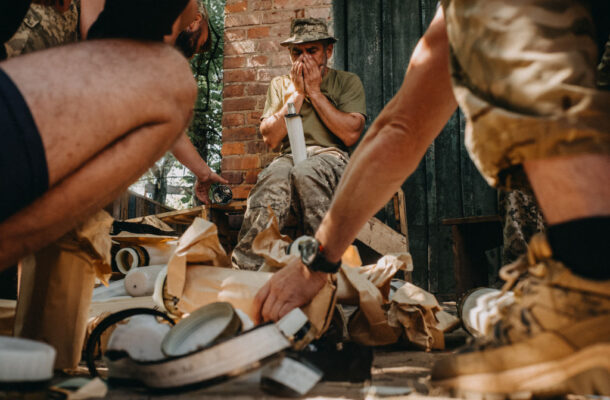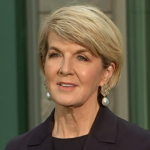Ukraine fights for the free world

The criticism of Australia’s recent package of assistance to Ukraine was justified. It managed to give a perception of a middling power’s apathy, rather than a regional power’s ambition.
However, Prime Minister Anthony Albanese’s attendance at next week’s NATO summit in Vilnius is another opportunity for Australia to take a more meaningful package to the core group of nations fighting for Ukraine’s sovereignty and against Moscow’s authoritarian aggression.
Such a package would be consistent with the defence strategic review, which rightly recognised that deterrence must be the cornerstone concept of a national defence strategy, including through working with partners.
Vitally, this is not just about a war on the other side of the world that we can choose to ignore. To help deter aggression in the Indo-Pacific, we must help Ukraine prevail in Europe. Partners must provide the necessary military support to Ukraine to take advantage of the current operational advantage—heightened by the turmoil of the Prigozhin mutiny—and push Russia out of its territory to reclaim its sovereignty.
While the bulk will need to come from NATO members, Australia, as a NATO enhanced opportunities partner, has much to offer. In terms of military equipment, Defence should look harder at what is possible for a friend suffering war crimes, and not let the perfect be the enemy of the good. It’s likely we can afford to send some Hawkeis, and the previously dismissed but now live option of jets in the form of retired F/A-18 Hornet fourth-generation fighters.
Failure in Ukraine would only embolden authoritarian aggression elsewhere in the world and could fatally undermine the notion of collective security. This includes the framework of international laws that provide vital protections and establish inviolable rights for states and civilians alike, also known as the international rules-based system.
Ukraine is fighting for its very survival—as a nation, a people and a culture. It cannot and will not stop. It is fighting within and beyond Ukraine, using every available lever: political, technological, military, economic, diplomatic and, importantly, informational.
Russia’s fight is for a fiction, laid bare in unexpected and dramatic fashion by Vladimir Putin’s own creation, Yevgeny Prigozhin, over an extraordinary weekend. It is a fiction based on Putin’s obsession to restore the Soviet Union, scaffolded by a complex information warfare campaign and enforced with heavy-handed violence at home and atrocities in Ukraine.
Despite an unconvincing start, key actors within NATO—the Baltic states, Poland, the UK and the US—unwound entrenched institutional inertia to provide support. Germany has gone from offering helmets to supplying tanks. This collective success seems to have surprised almost as many in the West as it has Putin (and likely his ‘no limits’ partner, China’s President Xi Jinping).
Australia’s and Japan’s support have been important in reinforcing the fact that Russia’s invasion of Ukraine is a global issue, not just an Atlantic problem. The Indo-Pacific has a key interest in ensuring that the rule of law prevails, that Ukraine prevails, and that there is no perception that crises and conflicts can be ‘regional’ and ‘contained’.
We cannot stem the contagion of war and the erosion of collective security unless we deny Russia its aims and hold it responsible for its actions.
Ukraine’s partnerships are among the asymmetric advantages it holds—along with the iron will of its people and its masterful use of strategic communications. But the partnerships are only useful if the partners provide real resources that give Ukraine its much-needed military edge.
The longer the war goes on, the more uncertainty there will be—across changes in governments, economies and popular support. The longer it takes to defeat Russia’s aggression, restore the rule of law, and ensure justice for Russia’s crimes, the greater the risk to our efforts to deter any such aggression in the Indo-Pacific.
The time to end the war in Ukraine is now. Russia is significantly weakened, but there are opportunities on which Ukraine can capitalise only if it has greater technological and military assistance from countries like Australia. This could likely enable the Ukrainians to push the Russian military back to its borders.
If it’s clear that Russia is failing to achieve its aims, Xi’s concern will grow. Xi and his military are excellent students of strategy and warfare. The key lesson that Ukraine and the free world want Xi to take away—in the interests of global peace and security—is that unilateral authoritarian aggression will not succeed and comes at an unacceptable cost: economically, militarily nd politically. If that can be achieved, deterrence in the Pacific will be significantly bolstered.
Beyond that signal to other authoritarians, the lessons from Ukraine can help Australia build the stronger and more focused force the government wants. It can enable policymakers to better understand necessary industrial capability, and ultimately help deter aggression in the Pacific.
As Albanese heads for Vilnius, he should offer everything Australia possibly can afford, confident that any concerns about depleting our own capability are outweighed by the cost of failing to provide Ukraine with relevant support today.
This article was published by The Strategist.
Bec Shrimpton has over 20 years’ experience in policy, operational and corporate roles in the Australian Department of Defence and in the Department of Foreign Affairs and Trade. She is a Director at the Australian Strategic Policy Institute, and convenes The Sydney Dialogue, a policy summit for critical, emerging, cyber and space technology.











